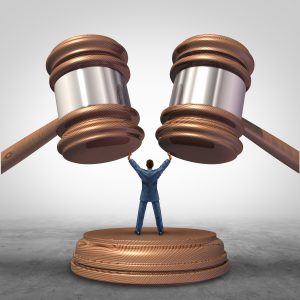
Mediation resolution and mediate legal disputes in business as a concept with a businessman or lawyer separating two judge mallets or gavel as competitors in arbitration.
People are born into certain historical eras. An era is a period of time marked by distinctive characteristics and events that shape the individuals living during that time period.
The relatively brief history of America is marked by a number of widely accepted historical eras that include the American Revolution (1763-1783), the Civil War & Reconstruction (1861-1877), the Great Depression & World War II (1929-1945), etc.

Stand With Survivors: Legal Tools To Make A Real Difference This DVAM
Enhance your legal skills to advocate for survivors of intimate partner violence.
Lawyers are born into certain eras in the civil justice system. Like historians, we can disagree and debate the specific time periods and defining characteristics of a given era. But there can be little doubt that certain forces and events shape our work within the larger system.
Those of us practicing law in the civil justice system today are doing so in the Era of Alternative Dispute Resolution. Alternative dispute resolution via private mediators and court-mandated settlement conferences have become an almost institutionalized pre-trial mandate to combat the effects of an underfunded and overworked civil justice system.
It seems as if everyday we open our mail and/or inboxes to find announcements that lawyer colleagues are now mediating on a full- or part-time basis. Mediation firms are growing and litigation firms are shrinking. The law of supply and demand is at work in the Era of Alternative Dispute Resolution.
Civil bench and jury trials are becoming extinct. According to a 2008 study by the Department of Justice’s Bureau of Justice Statistics, civil trials declined by over 50% between 1992 and 2005 in the nation’s 75 most populous counties. Torts trials decreased by 40% while real property trials decreased by 77% and contract based trials decreased by 63%.

AI + legal workflows: 5 plays that actually move the needle
Unsure where to start with AI? Learn 5 law firm workflows that can improve intake, conflicts, drafting, docketing, and time tracking—plus prompts, ethics tips, and steps for real ROI.
According to a 2011 paper by the Pound Civil Justice Institute, jury trials in federal courts constituted only 0.73% of the total dispositions of cases in 2010 while bench trials accounted for 0.34%. Civil jury trial rates have been below 1% since 2005, while bench trials have been below 1% since 1998.
While pro plaintiff interest groups often point to misguided “tort reform” efforts by the legislative branch as one of the biggest threats to the civil justice system, could it be that our voluntary relinquishment of the civil trial via alternative dispute resolution is the biggest threat of all?
Is the Era of Alternative Dispute Resolution good for the civil justice system? I don’t know. But it is definitely worth thinking about.
On a micro level, most practitioners would agree that voluntary pre-trial dispute resolution by the parties is a noble thing. Clinging to entrenched positions and avoiding worthwhile compromise is often counterproductive. Trials are uncertain endeavors for litigants. Trials are expensive in terms of dollars, time, and emotion. Alternative dispute resolution allows the parties to control the outcome of a given case. Parties should have the freedom to decide whether to avail themselves of the ultimate gift of the civil justice system — the trial — or resolve their disputes behind closed doors.
On a macro level, trials are important for the overall system. Jury trials are democracy at its core, up close and personal. Jury trials allow ordinary people to participate and wield real power in their community. Jury trials allow representatives of the community to weigh in on the specific issues of a given case. Perhaps more importantly, the decisions of juries by way of verdicts help establish important community standards as it relates to issues ranging from the lengths corporate entities must go to warn the public of potential dangers associated with the products they sell to procedures that must be put in place to protect workers. Verdicts can change corporate practices and make products safer. The unpredictability of jury verdicts has a regulatory effect on certain types of corporate behavior.
A lot of folks are worried about American democracy and the undermining of our fundamental institutions. Mass gerrymandering has created a legislative branch that consists of elected officials that represent extremes. The Electoral College has produced an executive that received significantly less votes than his rival.
Our civil justice system, while less sexy for cable news outlets and their talking heads, is an equally important institution that has undergone decades of monumental change worthy of discussion. The replacement of the trial with mass mediations and other forms of alternative dispute resolution is continuing to change the civil justice system.
Could the Era of Alternative Dispute Resolution, for all of its benefits on a micro level, be detrimental to the civil justice system on a macro level?
 Jed Cain is a trial lawyer and partner with Herman, Herman, & Katz, LLC in New Orleans, Louisiana. Jed writes about family, the law, and Louisiana current events at Cain’s River. He can be reached by email at [email protected].
Jed Cain is a trial lawyer and partner with Herman, Herman, & Katz, LLC in New Orleans, Louisiana. Jed writes about family, the law, and Louisiana current events at Cain’s River. He can be reached by email at [email protected].